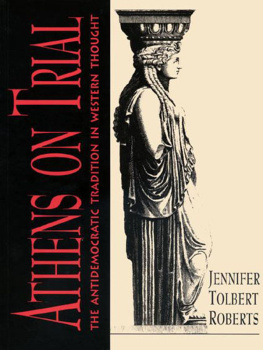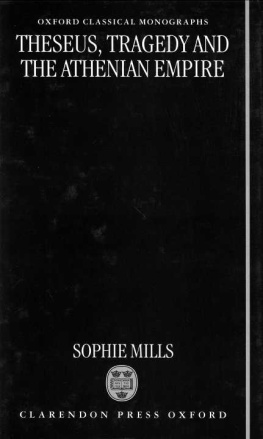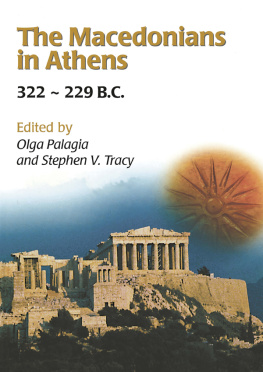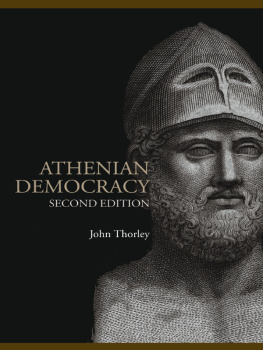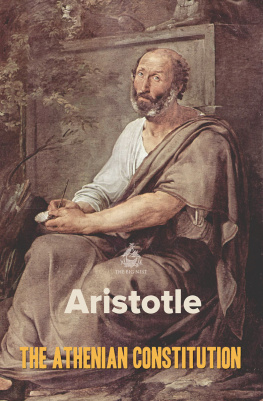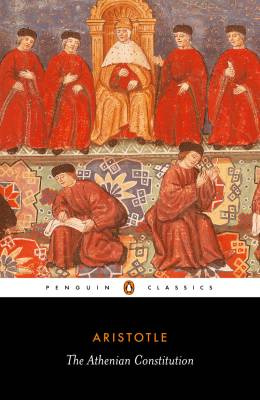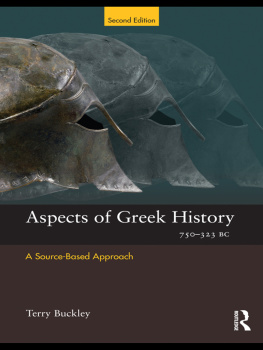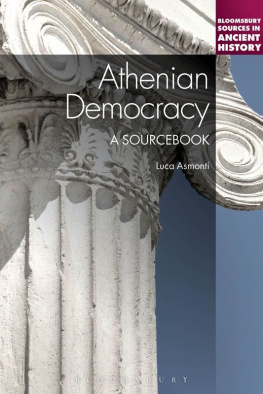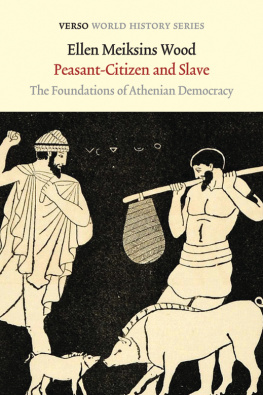
THE ATHENIAN CONSTITUTION
ADVISORY EDITOR: BETTY RADICE
ARISTOTLE was born at Stageira, in the dominion of the kings of Macedonia, in 384 BC. For twenty years he studied at Athens in the Academy of Plato, on whose death in 347 he left, and some time later became tutor of the young Alexander the Great When Alexander succeeded to the throne of Macedonia in 336, Aristotle returned to Athens and established his own school and research institute, the Lyceum, to which his great erudition attracted a large number of scholars. After Alexanders death in 323, anti-Macedonian feeling drove Aristotle out of Athens, and he fled to Chalcis in euboea, where he died in 322. His writings, which were of extraordinary range, profoundly affected the whole course of ancient and medieval philosophy, and they are still eagerly studied and debated by philosophers today. Very many of them have survived, and among the most famous are the Ethics and the Politics, both Penguin Classics.
P. J. RHODES was born in London in 1940, and was educated at Queen Elizabeths Grammar School, Barnet, and Wadham College, Oxford. He held a research scholarship at Merton College, Oxford, and worked also at the British School in Athens and Tbingen University. Since 1965 he has taught at Durham University, where he is now Professor of Ancient History; he has spent a year as Fellow of the Center for Hellenic Studies, Washington, DC, and a year as a Member of the Institute for Advanced Study, Princeton, NJ. He is also a Fellow of the British Academy. His main interest is in Greek politics and political institutions; his major Commentary on the Aristotelian Athenation Politeia was published in 1981 and reissued in 1993. His other publications include The Athenian Boule, The Athenian Empire, The Decrees of the Greek States (with D. M. Lewis), Greek Historical Inscriptions, 404323 BC (with R. Osborne), and editions of Thucydides II, III, and IV.
ARISTOTLE
THE ATHENIAN CONSTITUTION

TRANSLATED WITH INTRODUCTION AND NOTES BY
P. J. RHODES
PENGUIN BOOKS
PENGUIN BOOKS
Published by the Penguin Group
Penguin Books Ltd, 80 Strand, London WC2R 0RL, England
Penguin Putnam Inc., 375 Hudson Street, New York, New York 10014, USA
Penguin Books Australia Ltd, 250 Camberwell Road, Camberwell, Victoria 3124, Australia
Penguin Books Canada Ltd, 10 Alcorn Avenue, Toronto, Ontario, Canada M4V 3B2
Penguin Books India (P) Ltd, 11 Community Centre, Panchsheel Park, New Delhi 110 017, India
Penguin Books (NZ) Ltd, Cnr Rosedale and Airborne Roads, Albany, Auckland, New Zealand
Penguin Books (South Africa) (Pty) Ltd, 24 Sturdee Avenue, Rosebank 2196, South Africa
Penguin Books Ltd, Registered Offices: 80 Strand, London WC2R 0RL, England
www.penguin.com
This translation first published 1984
Reprinted with corrections 2002
22
This translation, introduction and notes copyright P. J. Rhodes, 1984, 2002
All rights reserved
Except in the United States of America, this book is sold subject
to the condition that it shall not, by way of trade or otherwise, be lent,
re-sold, hired out, or otherwise circulated without the publishers
prior consent in any form of binding or cover other than that in
which it is published and without a similar condition including this
condition being imposed on the subsequent purchaser
CONTENTS
LIST OF ILLUSTRATIONS AND MAPS
Illustrations
Maps
INTRODUCTION
An anonymous pupil of Aristotle would not have looked attractive on the title page, and would have been awkward for purposes of reference; but although the Athenian Constitution was regarded in the ancient world as the work of Aristotle, and is accepted as such by some modern scholars, it was more probably written by an anonymous pupil and not by Aristotle himself. It is, however, a work of great importance. Classical Athens was the model of democracy in a world in which different city-states lived under different degrees of democracy or oligarchy, and in writing a study of the Athenian democracy first a historical account showing how the classical form of the democracy had been brought into existence, and then an analysis of how the democratic constitution worked in his own day the author has produced a work of a kind which no one had attempted until Aristotle set some of his pupils to study the constitutions of different Greek states.
Aristotle was born at Stagirus, in north-eastern Greece, in 384 BC. He was in Athens, as a pupil of Plato, from 367 until Platos death in 347; he then left Athens, and after periods elsewhere was appointed by king Philip of Macedon to be tutor to his son, Alexander the Great. In 336 Alexander succeeded Philip, and in 335 Aristotle returned to Athens and opened a philosophical school there. In 323, on the death of Alexander, Athens embarked on a war against Macedon, and Aristotle left the city; in 322 he died, and Athens and her allies were defeated in the war; in 321 the democratic constitution of Athens was overthrown, at the insistence of the Macedonians.
Aristotles Nicomachean Ethics ends with a transitional passage leading to his Politics, and towards the end of this passage he says (X. 1181b):
First, if any individual points have been well made by previous writers, let us try to follow them up; then from the collection of constitutions we must examine what sort of thing preserves and what sort of thing destroys cities and particular constitutions, and for what reasons some are well administered and others are not.
The corpus of Aristotles works transmitted to us by medieval and renaissance scribes does not include a collection of constitutions, but there are lists of Aristotles works made in antiquity, which mention far more than the surviving corpus, and which do include a collection of 158 constitutions. A man called Heraclides probably Heraclides Lembus, who lived in Alexandria in the second century BC produced a set of excerpts from the collection; later someone else produced a set of excerpts from the excerpts, which survived to be copied by medieval scribes: we have what amounts to a page or two of print on Athens (translated here on pp. 11718), followed by much briefer passages on forty-three other states. Also we have references to and quotations from the collection by other ancient writers, and a collection of these fragments made by V. Rose in 1886 filled 110 pages and ranged over sixty-eight or sixty-nine of the constitutions.
Meanwhile, in 1881, it had been suggested by T. Bergk that some fragments of papyrus acquired by the Egyptian Museum in Berlin two years earlier were from a text of the Athenian Constitution. Not everyone accepted the suggestion, and Bergk himself could not believe that a long quotation from a poem by Solon, in one of the fragments, belonged to the Athenian Constitution. Then, early in 1890, F. G. Kenyon, who was working on a set of papyri bought for the British Museum by E. A. T. W. Budge, identified as the Athenian Constitution a text written on the back of some abandoned financial accounts of the late 70s AD (and found that the Berlin fragments, including the quotation from Solon, did indeed belong to this work). The first public announcement was made in The Times on 19 January 1891, and Kenyon published the first edition of the text on 30 January 1891. Later a few separate, small fragments were found to belong to the British Museums papyrus; but no other text of this work has been found, and no text of any of the other constitutions.


